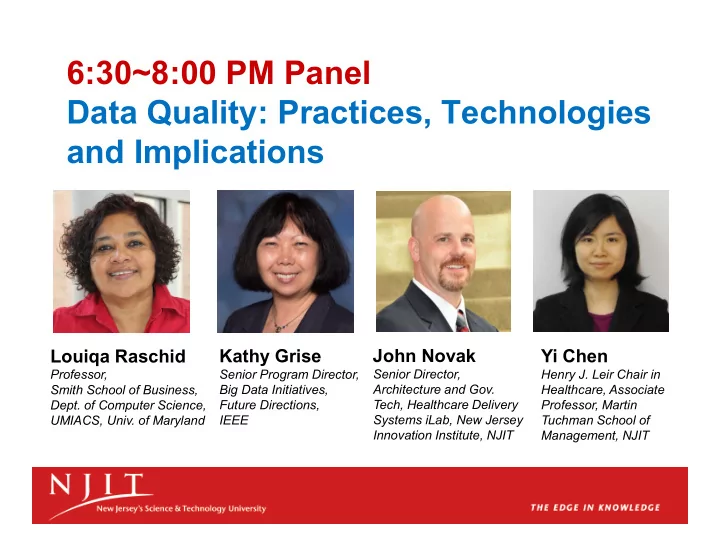

6:30~8:00 PM Panel Data Quality: Practices, Technologies and Implications Louiqa Raschid Kathy Grise John Novak Yi Chen Senior Program Director, Senior Director, Henry J. Leir Chair in Professor, Smith School of Business, Big Data Initiatives, Architecture and Gov. Healthcare, Associate Dept. of Computer Science, Future Directions, Tech, Healthcare Delivery Professor, Martin Systems iLab, New Jersey UMIACS, Univ. of Maryland IEEE Tuchman School of Innovation Institute, NJIT Management, NJIT
Big Data in Healthcare • Data with exponential growth are observed in Healthcare • Big data analytics hold big promises on – Early risk warning and disease prediction – Clinical decision support – Personalized treatment and precision medicine – Public health – Patient engagement Improve outcomes Lower down costs 1
Data Quality is Critical • Cleanness Data – Incomplete data – Duplicate data – Invalid data – Inaccurate data • Usefulness of data – Trustworthiness – Timeliness – Traceability 2
How Dirty Data Are Generated? • Data Entry • Data Processing e.g. Information extraction from unstructured data can generate errors • Data Transport Data are generated from multiple sources and are presented in multiple formats. Data integration can generate errors 3
Panel Structure • What are data quality issues in healthcare? - led by Mr. John Novak • What are the state-of-art technologies to address data quality challenges? - led by Dr. Louiqa Raschid • What are community resources (e.g. standards) to address data quality problems? - led by Ms. Kathy Grise • What are recommended action items? 4
Gaps and Action Items - Novak • What are the gaps between needs and practices? • Consistent data – Sharable – Consistent – Normalized • What are the recommended actions to take on data quality problems in healthcare? – Define minimum required information for patient matching – Publish and champion minimum required – Encourage the sharing of data
Gaps and Action Items - Raschid ● First generation tools work well. ● Next generation needs to focus on processes and workflows and HumInt. ● Scientists still spend huge amounts of time on cleaning. How can we fix this problem? ● Is Open Knowledge Networks a solution? ● An unexpected case study ...
Gaps and Action items - Grise 1) What are the gaps between needs and practices? • Lack of standards and governance • Inconsistent, unpredictable data entry • Vendors may be concerned about proprietary and monetary value which inhibit ability to share 2) What are the recommended actions to take on data quality problems in healthcare? • Define and establish consistent standards and governance applicable to overall data formats, data generation, data collection, data analysis • Establish agreement, and if not agreement, at least conformance of compatible instruments, software applications – requires cooperation among manufactures and suppliers • Provide consistent training of healthcare professionals for improved data entry and interpretation 7
Gaps and Action items - Yi • Techniques to assist user data entry are in high demand, especially in EHR • Establishing incentives for providing high-quality data 8
Questions?
Recommend
More recommend